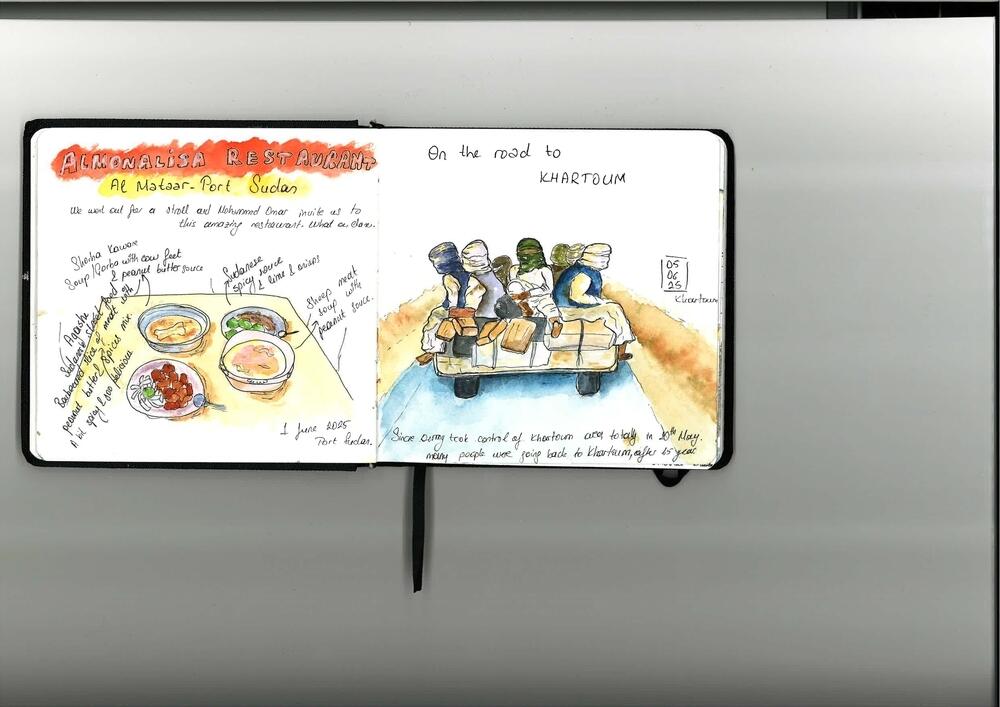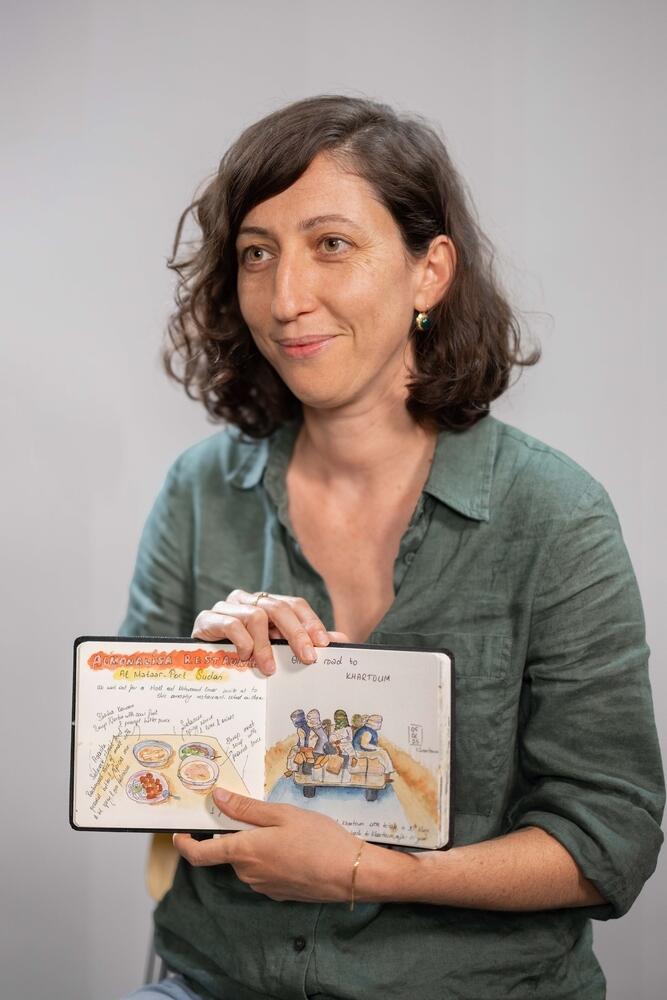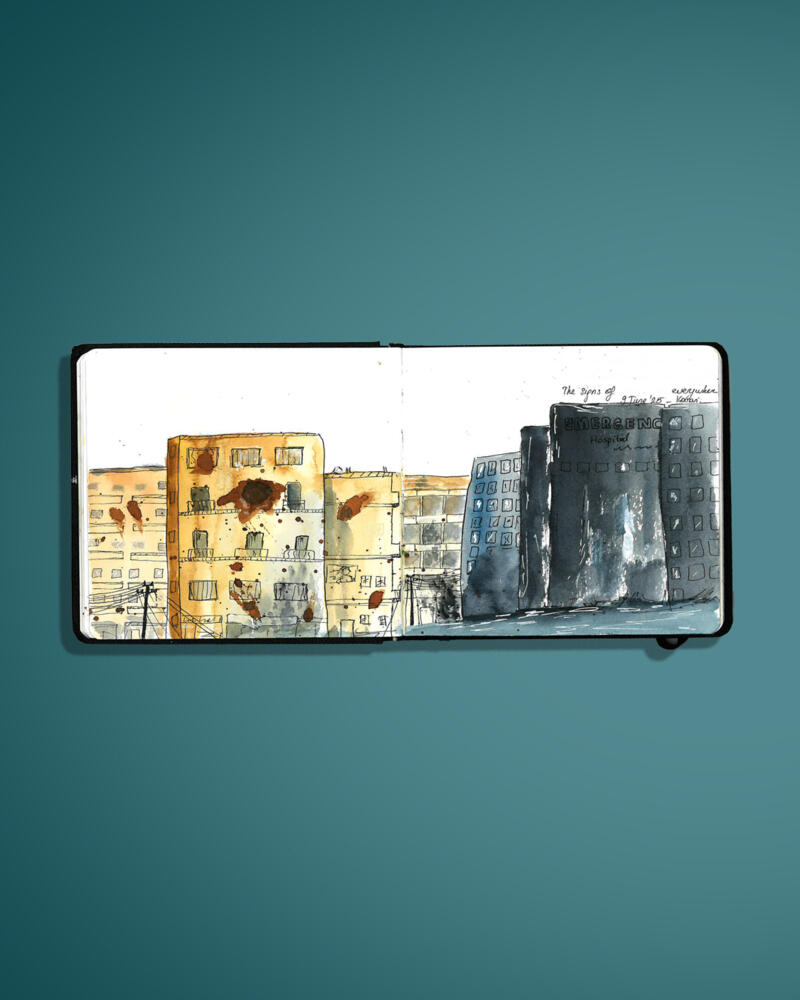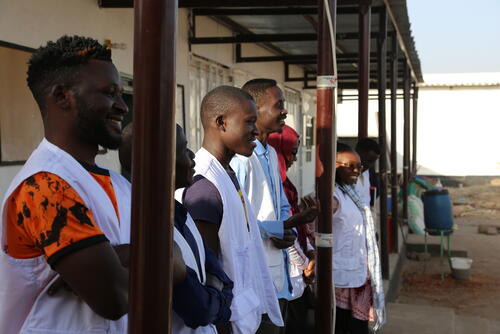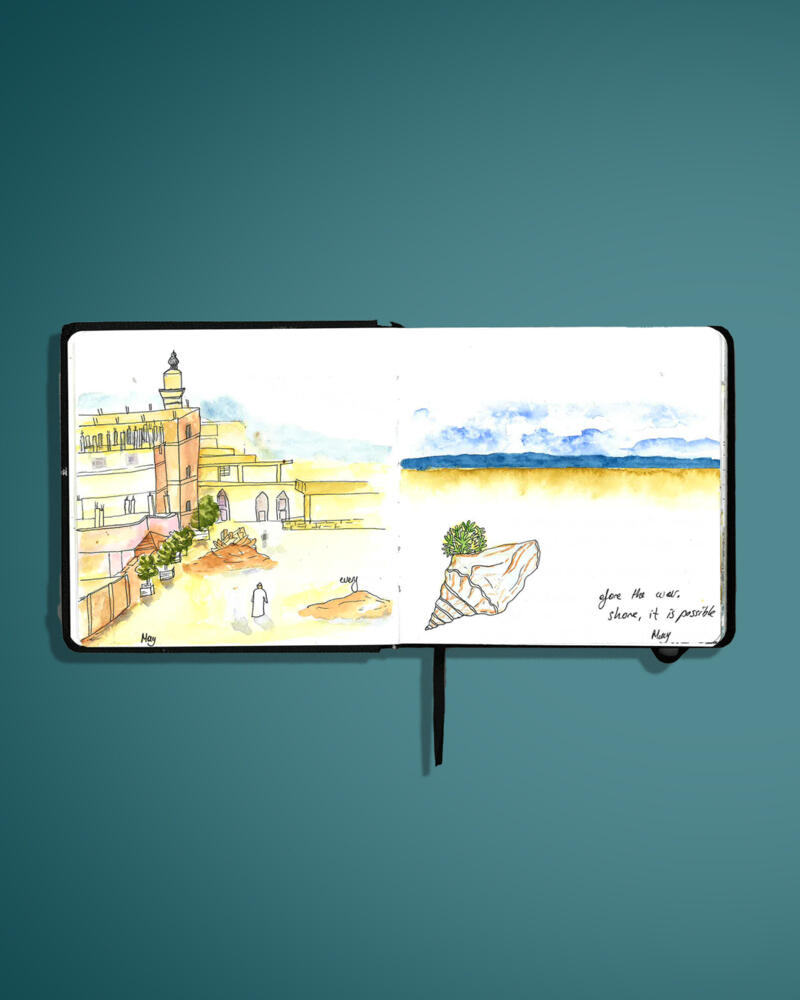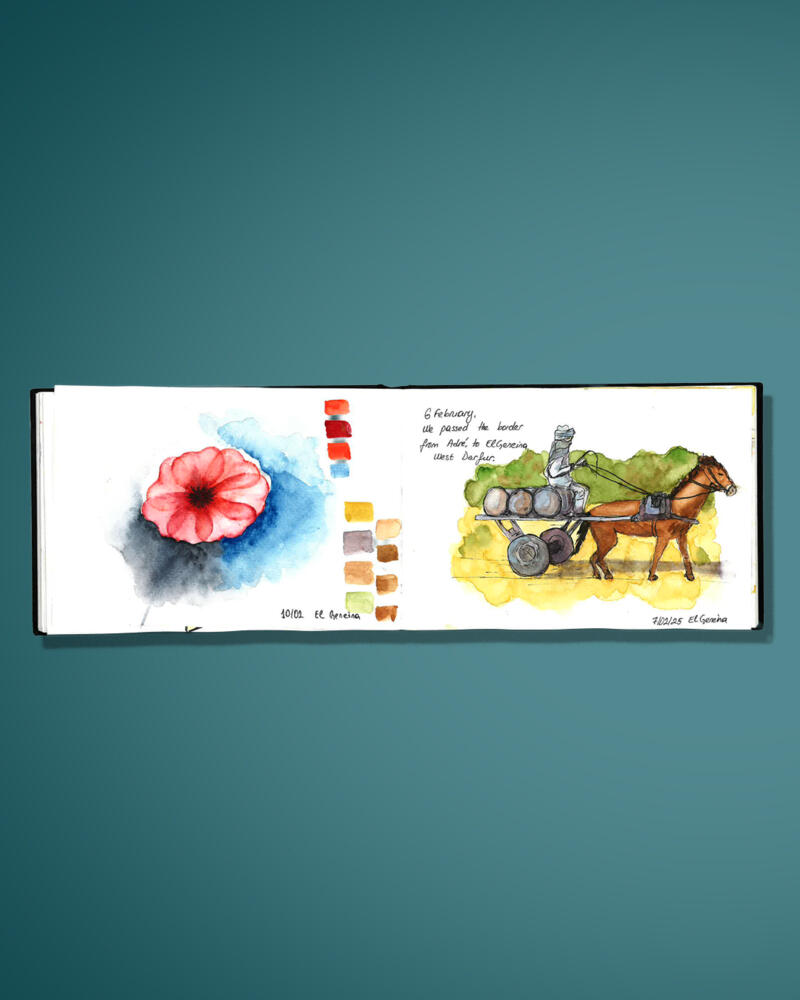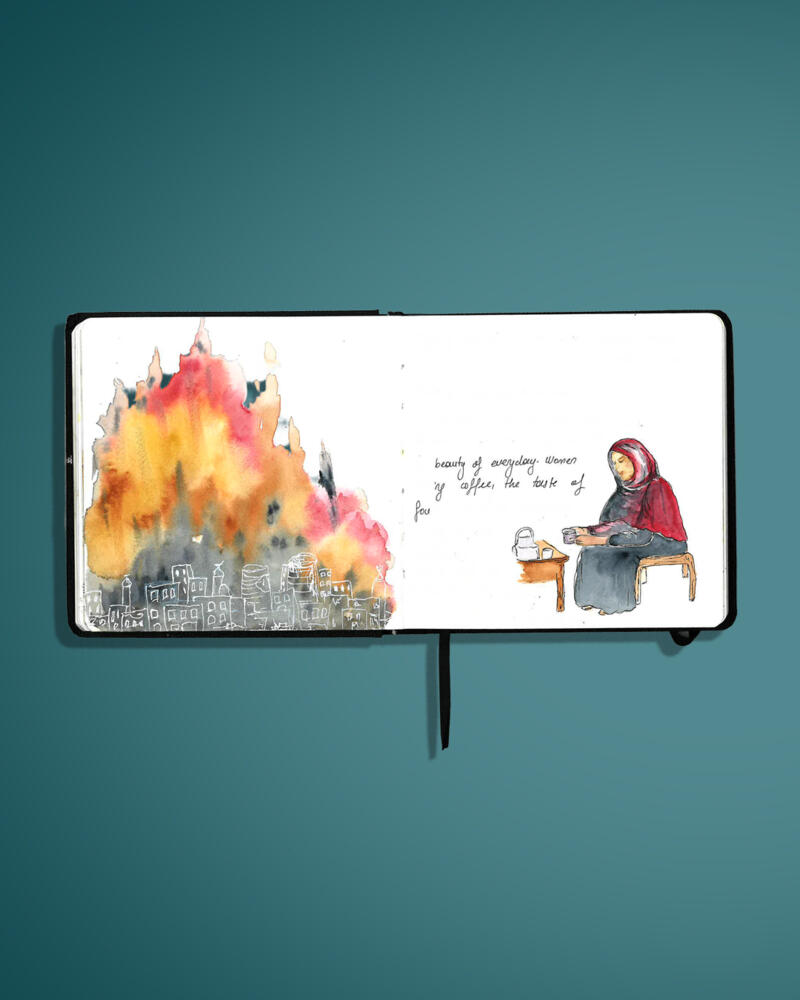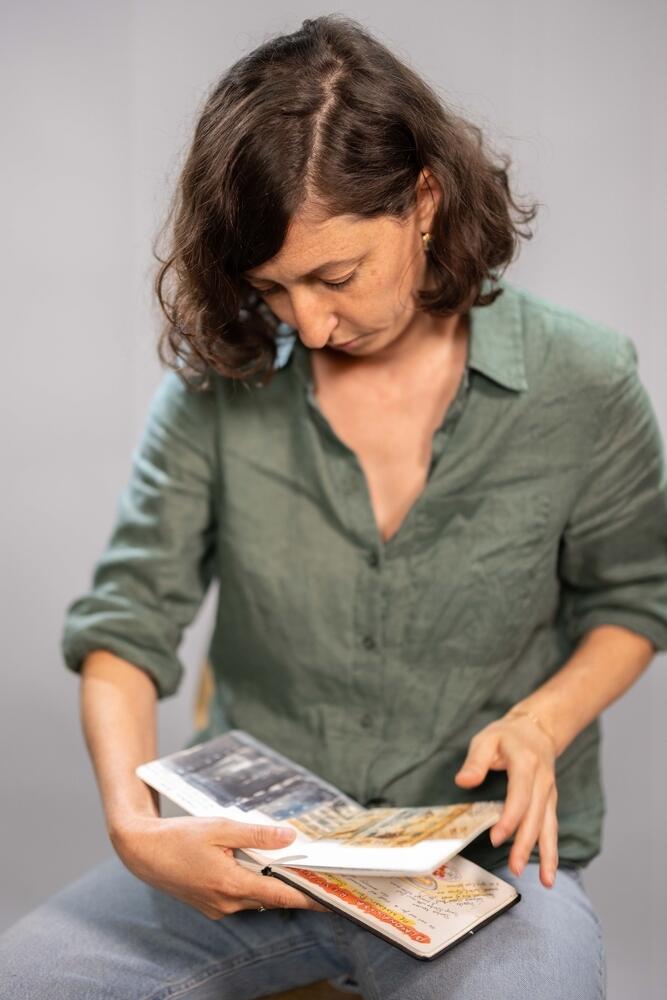’Sudan’s crisis of compassion, sketched in my watercolour journal’
1 October 2025
Sudan is facing one of the world’s gravest yet most overlooked crises. Since the war began in April 2023, nearly 12 million people have been displaced and more than 8 million face emergencies or high-level food insecurity.
Up to 80% of health facilities in conflict zones are non-functional, while attacks on health care and aid workers continue. Despite this massive scale of suffering, Sudan rarely makes international news.
In 2025, Narin Fandoglu, Operations Advisor with MSF based in Geneva, visited Sudan twice: first to West Darfur, where she supported the launch of a project on malnutrition and child health in Fora Baranga, and later to Port Sudan and Khartoum, where she witnessed both the challenges of access and the efforts of MSF teams on the ground.
Narin Fandoglu, MSF operational advisor based in Geneva.
"The scenes change: different ages, genders, faces, and stories. But when I look into the eyes of the young ones, of women, even of men on the road of displacement and migration, do you know who I see reflected in their eyes? I see myself.
I am Narin Fandoglu—human before I became a humanitarian. My journey with MSF began in 2016.
Years later, while working in migration responses, it suddenly struck me: I was a migrant child too.
That realisation stayed with me, and I believe it shaped my path with MSF.
Almost a decade working with MSF has meant many assignments and countless stories: Nights when my heart bled with what I had seen and heard; moments when the weight of it all pushed me into a complete emotional freeze - I could not cry, I could not scream.
The burden was heavy. But because I must care for myself to keep caring for others, I needed a way to release those emotions. And so, I turned back to a small thing from my childhood: sketching.
In 2017 I began to draw what I saw in my watercolour journal. It helped, I cried it out, and the next day I went back, ready to support people in dire need.
Sketching became my way to slow down, to process my emotions, to keep going.
On the roads of Khartoum and Darfur
I visited Sudan twice in 2025, once to the east, once to the west. It pained me to recognize the country this way, split in two.
In February, I went to Chad, then across the border to Darfur, Sudan. I spent two weeks in El Geneina, the capital of West Darfur state, and then one week in Fora Baranga in the south of this state, where an MSF project was just starting, mainly for malnutrition and child health.
Then I returned at the end of May, this time to Port Sudan and then Khartoum.
Access itself is one of Sudan’s greatest challenges. To reach Khartoum, we flew from Geneva to Nairobi, then took a UNHAS flight to Port Sudan, and finally travelled two days by road. A journey just to arrive. And when I did, I was so relieved to finally see my colleagues, who had been waiting to get into the country for more than a month because of visas and paperwork.
Since the war erupted in Khartoum in April 2023, I had been following the news closely. My role is not usually that of a first responder—other colleagues begin operations before me—but Sudan had been on my mind since the demonstrations in 2019. I felt connected, especially to the women on the frontlines. Their bravery inspired me; I felt bound to them in solidarity.
It was deeply moving to witness how much effort our colleagues went to negotiate getting in and setting up operations. Today, our teams include more than 1,400 staff, both locally hired and internationally, working across many health facilities and supporting Ministry of Health teams. Seeing that level of development, despite the obstacles, was strongly encouraging.
Sketches that stayed with me
This year, in Sudan, I kept sketching. But this time, I also wanted to document what I was seeing, what I was feeling.
Often, when I come back from countries like Sudan—forgotten conflicts—even those closest to me only associate these places with war and suffering. People in my life rarely ask about daily life there; some avoid the subject altogether. Through my drawings, I try to share another perspective.
So, I sketched little details: markets, coffee shops, roads, food. To show that Sudan is more than conflict. Alongside war, there is resilience, beauty, and everyday life.
When I shared a drawing of the pyramids in Sudan, many people didn’t even know they existed. That sketch sparked conversations about history and culture, not only about war.
In El Geneina, the capital of West Darfur, I painted a clay water pot I saw in the street. My colleagues explained that neighbors maintain these pots so anyone passing by can drink cool water. A simple, generous tradition that endures even in war. I found that deeply moving, and I wanted to honour it in paint.
From Darfur, I also remember a man carrying fuel on a wooden cart pulled by a weary donkey. It was scorching hot, the air bone-dry, people waiting for hours. From the comfort and convenience of Geneva, the city I reside in, to that scene of struggle—the contrast unsettled me. It left me questioning the injustices of our divided world.
And on the road from Port Sudan to Khartoum, I remember a woman making coffee. Her stand was set up in front of a half-ruined house, almost in the middle of nowhere. At first, she seemed alone. Then I noticed a baby on a bed behind her, and a toddler playing nearby. She worked while caring for her children. When I ordered coffee without sugar or ginger, she laughed through our driver and teased me for my poor taste. Her strength and ease embodied the Sudanese women I had imagined.
Later, I painted her—not a portrait, but a memory, a mixture of her presence and the impression she left.
What If I were Sudanese…
Wherever I go, I ask myself: if I had been born here, what would my life look like? We don’t choose where we’re born, which family, or which passport. Choices matter, yes, but where we begin shapes so much of where we end up.
When I see refugees or people we support, I recognize myself in them. I could be in their place; they could be in mine. Our work is not about helper and receiver—it is solidarity between humans.
And yet, I often feel caught between lives.
In the field, I arrive from Geneva, with a “very comfortable” life, while my Sudanese colleagues live in remote areas or even in displacement camps. It makes me wonder: should I be doing more? At home, my family and friends live with my absence three or four months a year. Plans are fragile. I also feel the need to explain what I do, what is happening.
So, when I once again tell my family and friends, ‘I’m going to Sudan,’ I hope they will understand not only how deeply the war impacts lives, but also that there is warmth, humour, and daily life still carrying on. Through pictures, I can share Sudan more honestly.
Now I want to share with a wider audience—with you who are reading my words, because I want people to see Sudan, a country that feels forgotten. We are facing not only a humanitarian crisis, but a crisis of compassion, because compassion begins with seeing, with refusing to turn away.
If people would only take a moment to read about Sudan, to think, to empathize, to imagine themselves in the shoes of those living through this war—that, in itself, would be one of the most meaningful acts.
We cannot stop the war with drawings, but we can refuse to look away, and we can bear witness."
Sudan Crisis
On Saturday 15 April 2023, a brutal civil war broke out across Sudan with a wave of gunfire, shelling and airstrikes. MSF teams already working in Sudan have been responding to the crisis since its first moments.
